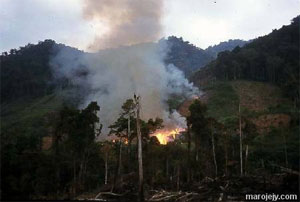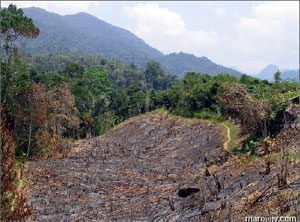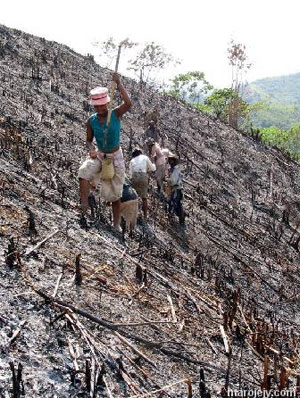As presidential election approaches, Madagascar’s lemur sanctuary burns
As presidential election approaches, Madagascar’s lemur sanctuary burns
Rhett Butler, mongabay.com
November 23, 2006 [corrected Nov. 24]
Forest fires are burning crucial lemur habitat and other hotbeds of biodiversity in Madagascar according to reports from the northeastern part of the island. The upcoming presidential election — a bitterly contested poll — may be partially to blame for the upswing in destruction says a leading local conservationist.
Madagascar, a biologically rich, but economically poor island country located off the southeastern coast of Africa is almost as famous for its environmental problems as for its lemurs, a charismatic group of primates found nowhere else on Earth. The country is home to some 90 types of lemurs as well as a bonanza of other rare and unusual creatures including a puma-like mongoose, spiny hedgehog-like beasts called tenrecs, and absurdly colorful chameleons. But these creatures are highly threatened by habitat destruction, most of which results from slash-and-burn agriculture that has left less than 10 percent of the island’s original forest cover standing.
While the Malagasy government has cracked down on deforestation and launched an ambitious conservation initiative, parts of the country are plagued with corruption, especially in the departments of natural resources at the local level, and legal impotence. The porous local law enforcement allows deforestation to continue with little risk of meaningful punishment for violators and can make conservation efforts futile.
Complicating the issue further, Madagascar is a desperately poor country where most people’s day-to-day survival is dependent upon natural resource use. Most Malagasy, as the people of Madagascar are known, never have an option to become factory or office workers; they must live off the land that surrounds them, making use of whatever resources they can find. Their most basic need — putting food on the table — far exceeds that of biodiversity and forest conservation. Their poverty costs Madagascar and the world through the loss of the island’s endemic biodiversity.
 Fire and forest clearing in the Marojejy area. Photo by Paul Atkinson, a Peace Corps worker evacuated from the region after death threats.  Slash-and-burn along trail just outside park boundary. Photo by Paul Atkinson, courtesy of www.marojejy.com  Slash-and-burn along trail just outside park boundary. Sowing rice on hillsides recently burned near Marojejy National Park. Photo by Paul Atkinson, courtesy of www.marojejy.com |
Lacking other known alternatives, the Malagasy torch the forest despite official prohibition. Each year tens of thousands of hectares of forest are burned to clear land for subsistence rice farming and cattle grazing. However, this year may be worse than usual due to a contentious presidential election that has diverted interest and resources away from forest protection and law enforcement.
“Hell just started here,” said Eric Mathieu (www.marojejy.com), a French conservationist who has lived in Andapa in northeast Madagascar for 13 years while working to preserve Marojejy National Park and Anjanaharibe-Sud Special Reserve. “The slash-and-burn is far worse than usual this year. With presidential elections coming, there is no control. You just have to sit and watch as a useless witness as the forests burn. Large portion of primary forests outside protected areas have been destroyed on the road from Sambava-Andapa. While the politicians campaign, the forests burn. Lemurs are losing habitat”
Lemurs aside, Mathieu says that slash-and-burners are putting their long-term livelihood at risk by forest clearing.
“We’re witnessing a people commit collective suicide for future generations,” he lamented. “It’s sad to watch the future go up in smoke. Every year November to January are depressing months. Too much smoke in the air. Too many fires around. Too many days without blue sky, just an orange ball floating in a bitter mist…. but this year is worse so far.”
Madagascar votes on December 3rd. Incumbent president Marc Ravalomanana, who has faced a military coup and an uptick in protests in recent weeks, is widely expected to win the election. Unlike his predecessor Didier Ratsiraka who was a disaster both for Madagascar’s environment and economy, Ravalomanana is a favorite among environmental groups for his stance on conservation, which has netted the country tens of millions of dollars in aid. Still as the polls approach, it is becoming apparent that no party needs the return of political stability more than his country’s forests.
“I am heartbroken that this great people [the Malagasy] are doing something so bad for their future,” said Mathieu. “Just pray that after the election something will be done.”.